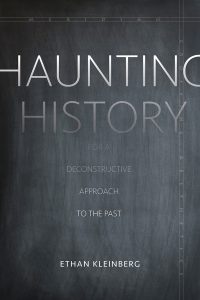Kleinberg’s Book Argues for a Deconstructive Approach to the Practice, Writing of History
 Ethan Kleinberg, director of the Center for the Humanities, is the author of Haunting History: For a Deconstructive Approach to the Past, published by Stanford University Press in August 2017.
Ethan Kleinberg, director of the Center for the Humanities, is the author of Haunting History: For a Deconstructive Approach to the Past, published by Stanford University Press in August 2017.
“Haunting History is about the ways we think about the past and ‘do’ history at a moment when the digital revolution is changing how we conduct research, store materials, and even write,” Kleinberg said. “In it I argue that many of strategies for writing about, but also understanding the past, are conditioned by the analog practices of the previous century which has served to create the illusion that the past can be studied like an object held in your hand or placed under a microscope.”
The past — by definition — is gone and thus has no definite properties or perhaps we can say that is has latent properties that are activated when we do history, Kleinberg explained. “But this activation of the past is always partial leaving remains that are hidden or dormant. This is a past that is absent but haunts us and can return in ways that disturb our conventional historical narratives and understanding of what the past and history is.”
To account for this play of absence and presence, Kleinberg advocate for a “hauntological” approach to the past.
The term “hauntology” is meant to expose the ways that historians take the spectral haunting absent past and silently replace it with a representation of it that appears to have the properties and essence of a present object.
“The hauntological approach is one that is attuned to the way the past, like a ghost, is both present and absent. But it also allows one to imagine a narrative of multiple or seemingly conflicting pasts that would be impossible to present in a traditional monograph but can be accommodated in the digital realm,” he said.
The discipline of history is facing a paradigm shift, Kleinberg explained, and historians whose mindsets were formed and constrained by print must now confront the changes that digital media makes in every aspect of their discipline. One part of this shift is the possibility of reconceptualizing historical works as multimodal, multi-temporal, and multi-media so as to resist the presentation and restrictions of a monolithic temporal narrative. In these models, time and space is, or can be, out of joint and it is in this way that way that new forms align with a hauntological narrative reconstruction focused on non-simultaneity, divergent historical paths, the instability of time, and the play of presence and absence.
“The book is an intervention in, or perhaps even a polemic against, the discipline of history and thus it is directed at historians and scholars who work in this field but it is written for anyone who is interested in the ways we deal with and come to represent the past…oh, and for anyone who likes a good ghost story,” Kleinberg said.
The book appears in Stanford University Press’s Meridian: Crossing Aesthetics, a selected series of books that explore literature, painting, music, architecture–and their theoretical phrasing, and present investigations in philosophy, literary theory, psychoanalysis, ethnology, politics, and history while recharting the territory of the aesthetic and disclosing new horizons for critical thought.
Kleinberg also is professor of history, professor of letters and executive editor of History and Theory.
On Sept. 28, Kleinberg will offer a talk and book signing at the Wesleyan RJ Julia Bookstore. In September, he will present a series of lectures and workshops on Haunting History at Toyo University in Tokyo, Japan. In October, he will attend a panel discussion devoted to the book at New York University. In March 2018, Kleinberg will give a series of lectures at the Université Bordeaux Montaigne as a visiting professor of philosophy and speak as a panelist at the European Social Science History Conference in Belfast, Ireland. In May, he will attend another panel discussion on Haunting History at Stanford University.

